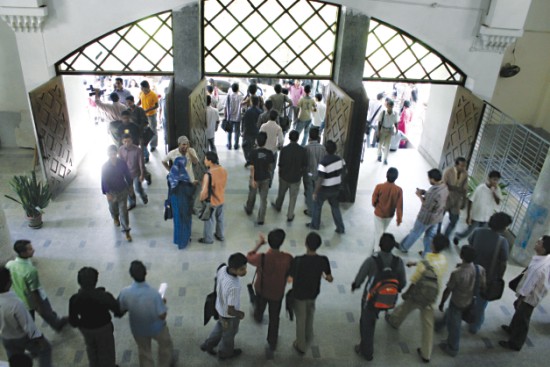
Inside
|
University Challenge Will the new law bring about a new reality, asks K. ANIS AHMED
The New Law The University Grants Commission (UGC), which played a leading role in drafting the law, sought to increase its own powers of oversight and those of the vice-chancellors, while simultaneously reducing the powers of the trustees. The trustees sought to retain their rightful autonomy, and to mitigate laws that might unduly hamper the growth of the sector. A point by point review of the 53 articles in the law will find that a majority of them, contrary to the initial media response, speak to the government's interests. The government has been granted enormous powers that did not exist before -- some well justified, others less so. Article 47 permits the government now to pursue violations on many counts: such as, opening or operating campuses or programs without permission; advertising unapproved foreign or local programs; misuse of endowment; illicit transfer of cross-border funds; acts deemed anti-state; failure to comply with the terms for permanent permission; and mismanagement of financial, academic or administrative affairs. Violation of any of these counts is punishable by up to 5 years in prison or a fine of Tk 10 lacs. It seems sensible to ban most of the practices named above, and one hopes the government will indeed take firm and targeted steps when deliberate or egregious violations occur. But, how sure are we that these provisions, many of which seem quite open-ended, will never be politically used? A major concern is who exactly will be held responsible under these laws? Given the witch-hunt of trustees so far, can we be sure that only persons specifically accountable for any given violation will be prosecuted?
Universities of different sizes and nature should have had a lot more freedom to decide what kind of structure makes sense for them. This would be one instance, though not the most egregious kind, of the problems that stem from excessive governmental activism in private sector operations. In comparison to the provisions described above, the trustees' concerns are reflected in only a few articles. First, instead of five years to build a five-acre campus, they now have seven years to build a one-acre campus. But, even this seemingly pragmatic shift is undermined by the demand that the one acre be "undivided." Where and how are 40-some Dhaka-based universities to find 'undivided' one-acre plots in this city? Also, how can one acre be sufficient for universities of vastly differing size? Second, the UGC's attempt to have the power to approve the fees and salaries at these universities has been rightly checked by the parliamentary committee. Such an intrusion of a public body into private organisations might have easily led to corruption, while providing none of the expected benefits. Certain quarters will go on debating whether the law is too strict or too lax, but what really matters now is how the government uses this law: Will the UGC truly be able to rein in deliberate and egregious offenders? Will there be any support for the private universities, at least for the highly compliant ones, or only demands for compliance? The Context Private university critics seem quite oblivious to the fact that even the best of our public lot, Dhaka University, cannot be found among the top 500 universities in most global rankings. Yet, DU enjoys a government subsidy of 200 crores per year! Its wastefully large campus sits on public land worth thousands of crores and was built with public money to a similar tune. DU's operational subsidy must exceed 1000 crores just since independence. Given a fraction of that support, what might the best private universities have done? One should not engender a false comparison between public and private universities any further. Public universities are vital in all countries. Thanks to heavy government subsidies, they can offer access to a bright students who cannot otherwise afford tertiary degrees. They can also better support less market-oriented academic programs or research, which are often less able to attract revenues or grants. In developed economies, even private universities of a certain age and resources can play similar functions to a great extent. Instead of staying mired in a public-versus-private debate, we need to realise vividly why higher education in both forms matters more than it did even a few decades ago. In an era of increasingly knowledge-based economies, a nation's success is directly correlated not just to its general literacy, but to the percentage and quality of its tertiary graduates. So, what we need is an expansionary policy for higher education, but expansion without diluting quality. One can aid quality by enforcing smart regulations, and also by providing smart aid. In the new law, we have promise of smarter regulations, and so far no hint of support for this sector. The government has been slow to come forward with the necessary support presumably due to quality concerns about private universities. But, this perception is exaggerated by news reports that have failed to capture the substantial attainments of the sector. Thanks to the better private universities, thousands of students no longer need to go abroad, which saves the country substantial foreign currency. Graduates from these universities are being recruited by the best local and foreign companies. They are also going abroad to the best universities in the world for Master's and PhDs in increasing and notable numbers. If these universities provided education of no quality, as their most strident critics would have it, how could their graduates compete for jobs or foreign degrees? To create only as many new graduates as the best few private universities, the government would have needed to spend thousands of crores. Right now the country is getting the benefit of these young talents without costing the public coffers a single penny. Many private university graduates, who might have gone abroad, choose to stay in Bangladesh even after graduation and reduce brain drain. Indeed, a good number of talented Bangladeshis have come back to teach in these universities, creating a modicum of brain gain for the first time. Given the complex realities of this sector, where exemplary good has been achieved by at least a few institutions under frankly hostile circumstances, how should we view the new law? Will a new law, however good or "strict," be enough to bring about the changes we desire?
The Next Step If the government, indeed we as a nation, were really serious about improving higher education, and in particular the private universities, then in addition to smart enforcements of the new law, we would take other initiatives; such as the following: · Create an accreditation council, but do so in affiliation with credible foreign counterparts, and with total independence from any government agency. An accreditation council will be helpful only if it is free from any political or other forms of manipulation. · Encourage credible third-party rankings to come forward. When employers and students start using such rankings to value the universities and their programs, they will perforce engage in a positive competition and improve their qualities. Such rankings will indeed go much farther than any law in ensuring quality in the long-term. In the case of both accreditation and rating or ranking bodies, let criteria be absolutely transparent and sensitive to local realities. · Plan to revise the law within two years, especially to remove the antinomies in the present version. Also, take the initiative to revise or update the law every five years due to the new and fast-changing nature of the sector. · Drop the 'undivided' one-acre requirement, and focus on adequate square footage and facilities. Even world renowned universities in great metropolises tend to be scattered in many campuses of varying sizes, including former commercial or residential buildings. That is the universal nature of modern, urban campuses. To insist that private universities in a poor and congested city like ours replicate the green idyll of the public universities is simply impractical. · Stop taxing private universities. Remove VAT on student tuition. Indeed, don't tax any educational institutions, let them use their earnings to improve their size and quality. · Allow the universities to collateralise their assets as long as it is for the university's development. · Make government or foreign-funded funds for research or development easier for the private universities to access; don't place arbitrary or unnecessary barriers to their eligibility. · Provide government funding for scholarships. One could add many more items, possibly not of great interest to people outside the sector, but the list above is merely a sampling of things that could and should happen by way of support. So far, there is little evidence of any such initiatives forthcoming. We can go on believing that the trustees are the only problem. Even if every trustee of every private university were replaced by a professor, the sector's quality would not change one iota. There are other issues here, and we have not even begun to discuss them. For real change to occur, in addition to smart enforcement of the new law, we need a real tone and template shift in debates about this important and fledgling sector. We need to talk not just about controls, but also about support. We must not keep trying to impose the model of our heavily subsidised and under-performing public universities as a template for the private universities. (Indeed, we need to think hard about how to make the public universities function a lot better too). All key stakeholders need to change their mindsets. The trustees need to overcome unwarranted insecurities and authoritativeness. The UGC and relevant government agencies need to really extend some palpable support. The media's role could be crucial in shifting the dialogue from its current negative tenor to a more solutions-focused one. Leaders of the UGC and the trustees need to find a way to work better together. Both sides could start by toning down the rhetoric, and perhaps undertaking some trust building measures, such as forming a consultative committee. Educating the next generation is too important for our coterie interests to take precedence. By all means, restrain the real culprits. But also try to understand who's failing despite good intentions, and provide support that might help them. It might be more fun to tear down a few institutions -- it seems to have become a national specialty of ours. But, is that the best purpose of any new law? Or should we work together to actually build something? One hopes the new law will be used to help build a new reality for the next generation. K. Anis Ahmed is Vice-President of the ULAB Foundation.
|

 The law also seeks to confine the power of the trustees to constitutional, strategic and fiscal roles, whereas the VCs are empowered to run academic and administrative affairs. Trustees will head only the finance and disciplinary committees, whereas VCs will head the syndicate, the academic council and the selection committee. These role assignments are indeed quite sound, but it was a mistake to specify the composition of the many councils and committees.
The law also seeks to confine the power of the trustees to constitutional, strategic and fiscal roles, whereas the VCs are empowered to run academic and administrative affairs. Trustees will head only the finance and disciplinary committees, whereas VCs will head the syndicate, the academic council and the selection committee. These role assignments are indeed quite sound, but it was a mistake to specify the composition of the many councils and committees. 